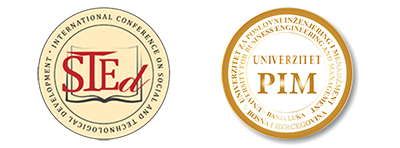POSSIBILITIES OF USING ARTIFICAL INTELLIGENCE TOOLS IN MATHEMATICS EDUCATION
The paper explores the potential integration of artificial intelligence (AI) tools in mathematics education. It delves into the transformative impact AI could have on teaching and learning processes within the realm of mathematics. By leveraging AI technologies such as machine learning algorithms and natural language processing, educators can...
By Limonka Koceva Lazarova, Natasha Stojkovik, Vasko Kokalanov
SIMULATION AND MODELING OF MEDICAL SCENARIOS WITH THE APPLICATION OF ARTIFICIAL INTELLIGENCE
The processes of simulation and modeling in medicine are not new. The popularization of modern technologies, primarily Artificial Intelligence (AI), has significantly impacted this segment of medical practice. This primarily refers to the development of predictive models and the creation of intelligent simulators based on these technologies. ...
By Vladan Čolić, Marija Mosilović, Enes Sukić
EXPERTISE JUSTIFICATION AND PROPOSAL OF INTRODUCING ARTIFICIAL INTELLIGENCE INTO MEDICATION PROCUREMENT SYSTEMS
This paper explores the justification and proposes a model for the introduction of artificial intelligence (AI) into medication procurement systems. By analyzing the current state of medication procurement, we identify key areas where AI could enhance efficiency, accuracy, and reliability of the process. The implementation of AI is suggested ...
By Vladimir Milićević, Igor Franc
APPLICATION OF AUDIO RECORDERS FOR REGISTERING SEISMIC SIGNALS FROM INDUCED SEISMICITY PRODUCED BY BLASTING IN OPEN PIT MINES
Seismic events induced by blasting operations in open pit mines pose significant challenges for monitoring and mitigation. This paper presents an innovative approach utilizing audio field recorders to capture seismic signals from both vertical and horizontal geophones deployed in mining environments. Field experiments were conducted at a mini...
By Zoran Panov, Dushan Bikov
USING CHATGPT IN SOLVING DEFINITE INTEGRALS
Artificial intelligence has an inevitable scientific and societal development nowadays. It is increasingly involved in human everyday life with the simple purpose of making it easier. Therefore, in this work, we will explore the possibilities of ChatGPT as an artificial intelligence tool in the application of definite integrals. The applicati...
By Biljana Zlatanovska, Marija Miteva, Mirjana Kocaleva Vitanova
WORDPRESS – AN ESSENTIAL TOOL FOR DIGITAL MARKETING
E-commerce is the process of selling goods and services over the Internet. Customers come to the website or online marketplace and buy products using electronic payments. After receiving the money, the merchant ships the goods or provides the service. Digital marketing offers the perfect way to meet and connect with our audience. We can test ...
By Mirjana Kocaleva Vitanova, Biljana Zlatanovska, Marija Miteva
OIL PRICES AND HEADLINE AND CORE INFLATION DYNAMICS IN SAUDI ARABIA
The study examines the relationship between oil prices and headline and core inflation in Saudi Arabia from 2001 to 2022. To examine short- and long-run dynamic effects, the study employs Johansen cointegration and Vector Error Correction Model (VECM) approach. Our findings indicate the presence of long run equilibrium relationship only in th...
By Rami Hijazine
DESIGN AND IMPLEMENTATION OF A SEISMIC DATA ACQUISITION PROTOTYPE SYSTEM INTENDED FOR VARIOUS APPLICATIONS
In this work, we present a prototype of a high-precision and high-resolution seismic data acquisition system (DAQ). This system is designed for real-time monitoring, data acquisition, and visualization of seismic activity, tailored specifically for local and micro-location applications, but not limited to them. The system has various applicat...
By Dushan Bikov, Zoran Panov, Risto Popovski
LEARN MORE ABOUT PARALLEL PROGRAMMING TECHNIQUES BY IMPLEMENTING A HISTOGRAM ON GPU
A histogram is a graphical representation of the distribution of data, commonly used as an analysis tool in statistics to visualize the frequency distribution of a dataset. Our focus of interest lies in the Frequency Histogram, a special graph that employs vertical columns to illustrate the frequency of occurrence of each data element. Here, ...
By Dushan Bikov, Limonka Koceva Lazarova, Zoran Panov
DISPLAY OF SPINAL DEFORMITIES IN AN AR ENVIRONMENT
In this paper, it is shown how a 3D model of the spinal column in patients with adolescent scoliosis can be visualized in augmented reality, through the use of various software tools. This process is based on analysing the surface of the back and identifying key anatomical markers. The application of developed 3D models can have a significant...
By Dijana Stojić, Saša Ćuković, Vanja Luković, Dejan Vujičić






